Highlights – Global Tariff Policies Become Increasingly Complex to Navigate
The increasing likelihood of Trump's return to the White House ominously signals further disruptions to Chinese supply chains1, many of which have already been impacted by recent geopolitical exchanges. With the earlier imposition of tariffs by the US on key Chinese products including electric vehicles, batteries, solar cells, and personal protective equipment, coupled with the EU's temporary tariffs on Chinese electric vehicles, global tariff policies have become an increasingly complex challenge for multinational enterprises to navigate. These renewed trade barriers have once again drawn the attention of multinational enterprises with established production bases in China, prompting them to reflect on their current supply chain strategies and react quickly to avoid damaging impacts to their cross-border businesses.
Background – Latest US and EU China Tariffs Increase Pressure on Chinese Manufacturers
On May 14, 2024, the US White House issued an announcement stating that President Biden had directed the Office of the US Trade Representative to release the results of the four-year review of the Section 301 tariffs imposed on China. According to these results, the United States has further imposed additional tariffs on $18 billion of Chinese imports, on top of the existing Section 301 tariffs. These goods cover a wide range of high-tech industries, including electric vehicles, batteries, semiconductors, solar panels, and other key components and products. Traditional industrial sectors such as steel, aluminum products, port cranes, and medical equipment will also be affected2.
The implementation of these tariff measures has once again caused concern in international economic and trade relations. With the increasing possibility of Trump's return to the White House, global attention has once again focused on his proposed policy of imposing a 10% tariff on all goods entering the United States, sparking widespread discussion3.
Meanwhile, the European Commission recently announced that it will impose temporary tariffs on Chinese imports of pure electric vehicles, effective from July 5, 20244. The measure will last for at least four months, during which EU member states will vote on whether to convert these temporary tariffs into full tariffs for a period of five years.
These tariff policies have intensified the export cost pressures on Chinese manufacturers in related industries, particularly affecting enterprises who rely on the US and the EU as their main export markets and high-tech exports. Affected enterprises are now being forced to actively explore new growth areas in the global market and adjust their development strategies to effectively respond to the increasing challenges and uncertainties of international trade.
- Strategic Responses
1.1 Migration of manufacturing: Depending on their strategic direction, the choice to de-risk or diversify from China will ultimately lead to a migration of some, or all, manufacturing capability (subject to resource availability in alternative markets).
Reduce Line Capacity
This involves substantially transferring product line capacity to an alternative Asia-Pacific (APAC) location, with a China principal managing the China-for-China market. The key features and benefits under this model are:
- China-for-China model ensures that relationships and business with local suppliers and customers can be maintained and strengthened
- Can develop China specific Intellectual Property (IP)
- Shift to non-China manufacturing mitigates the impact s301 punitive tariffs
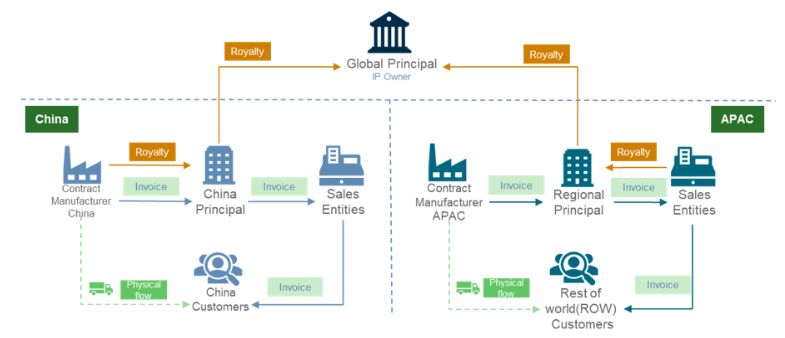
Full exit of production from China
Maintain China market share via a China trading Wholly Owned Foreign Enterprise (WOFE). The key features and benefits under this model are:
- No manufacturing in China
- Leverage Foreign-Trade Zones (FTZ)/bonded zones to defer import VAT and customs duty into China
- Simpler transfer pricing (TP) requirements under a buy/sell model
- Potential use of branch structures to cover China market
- Shift to non-China manufacturing reduces s301 tariff implications
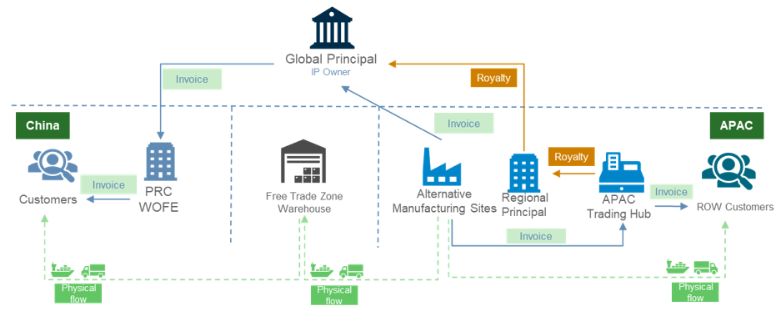
1.2 Tax can drive supply chain diversification: By leveraging tax-based initiatives, companies with China manufacturing facilities can mitigate or reduce the impact of increasing US punitive tariffs.
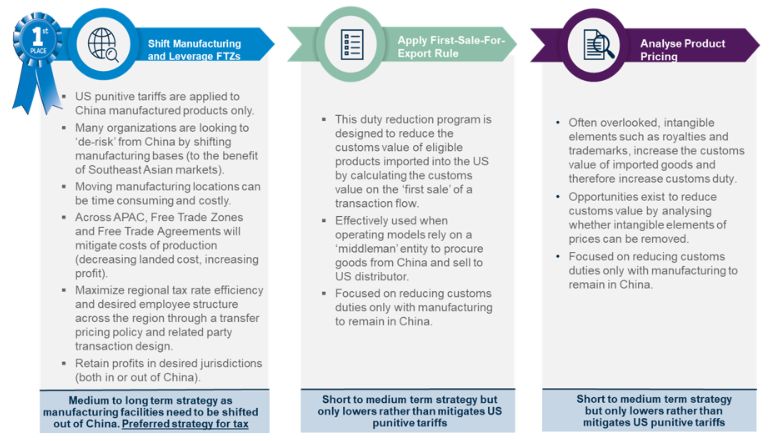
1.3 Manufacturing Destination Country Practical Considerations
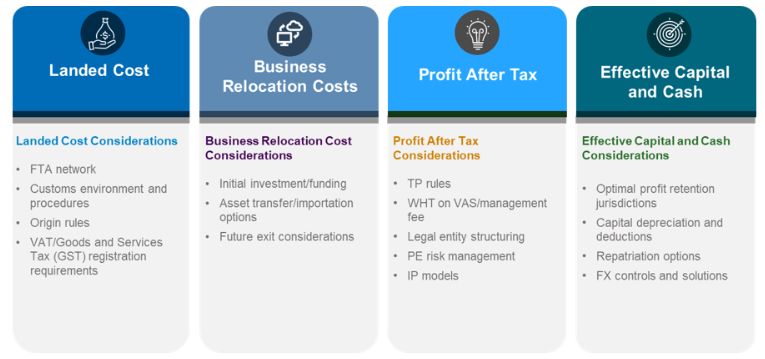
1.4 Comprehensive assessment: Through in-depth research and advice, enterprises can make more informed decisions and lay a solid foundation for their globalization strategy. A location study typically seeks to analyze the relative importance of the following factors:

- Mitigating Risks & Enhancing Adaptability
Geopolitical concerns are driving business to adopt a de-risking and de-coupling approach from China. Resulting potential challenges require careful consideration of changing market conditions.
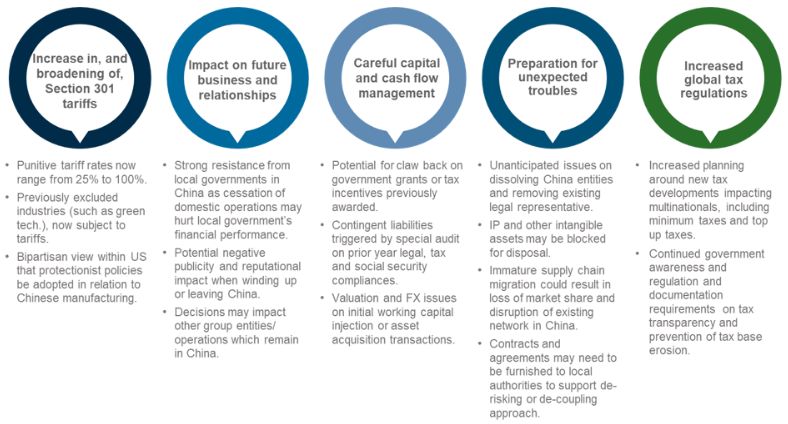
- Alvarez & Marsal Comments and Capabilities
While the imposition of tariffs by the US and the EU poses further challenges to the supply chains of Chinese enterprises, it also provides lucrative opportunities for tax efficient business transformation. Chinese enterprises should actively respond to challenges and achieve sustainable development through a variety of strategies, including market diversification, product and tech upgrades and tax supply chain optimization.
With a range of specialist expertise in operational implementation, finance and taxation, coupled with extensive hands-on experience in corporate leadership, efficient implementation capabilities and a results-driven approach, A&M is dedicated to assisting enterprises to develop tailored comprehensive solutions which prioritize practicality, emphasizing structural implementation and operational performance enhancement. Our value adding services encompass the following:
- Global Supply Chain Consulting: Cross-border tax planning and advice to ensure global tax compliance and group wide tax efficient optimization. Through initial consultations, we formulate supply chain improvement solutions which cover all tax angles, tailored to each unique business.
- Customized Corporate Services: Personalized services that account for all details and address enterprises' needs for supply chain enhancements, crafting exclusive solutions tailored to their specific requirements.
- Supply Chain Relocation and Implementation Support: Leveraging inbound China and international industrial park resources, we seek to match the specific demands of our clients and provide professional feasibility, relocation and implementation strategies.
- Global Customs: Managing customs matters worldwide to ensure smooth clearance of goods and minimize customs clearance costs.
Transfer Pricing: Delivering expert transfer pricing analyses to achieve commercial tax objectives and ensure the global compliance of our client's cross-border transactions.
Footnotes
1 The US Election's Impact on China - How do Trump and Biden Differ? (china-briefing.com)
2 FACT SHEET: President Biden Takes Action to Protect American Workers and Businesses from China's Unfair Trade Practices | The White House
3 Trump's proposed 10% tariff plan would shake up every asset class: Strategist (cnbc.com)
4 Provisional duties on battery electric vehicles from China (europa.eu)
The content of this article is intended to provide a general guide to the subject matter. Specialist advice should be sought about your specific circumstances.




